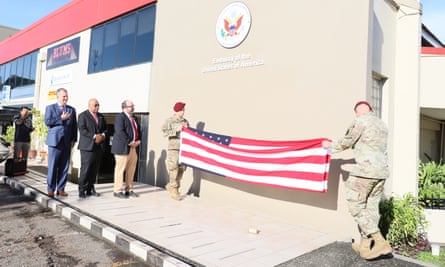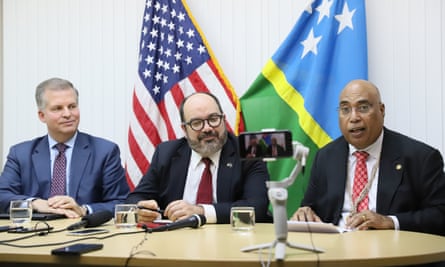The United States has opened an embassy in Solomon Islands after a 30-year absence as it seeks to boost diplomatic relations in the Pacific as a counter to China.
The US secretary of state, Antony Blinken, announced the news late on Wednesday, saying that “more than any other part of the world, the Indo-Pacific region – including the Pacific Islands – will shape the world’s trajectory in the 21st century”.
The top US diplomat announced plans to open a diplomatic mission in the Pacific island nation during a visit to the region last year, with the state department intending to broaden engagement and deepen international cooperation with the Solomons.
The last US embassy in the Solomons closed in 1993 amid post-cold war budget cuts and the US was represented there by an ambassador based in Papua New Guinea.
In a statement on Wednesday, Blinken said the state department informed Solomon Islands’ government that the opening of the new embassy in the capital, Honiara, became official as of 27 January.
Last February, I announced that the United States would establish an embassy in Solomon Islands. Now, that pledge is a reality. The United States is a Pacific country, and we are taking another important step forward in helping deliver for our people and for the region we share. pic.twitter.com/lilp0ywZl9
— Secretary Antony Blinken (@SecBlinken) February 1, 2023
He said the US was committed to working for the Indo-Pacific region to be “free and open” and an “environment where democracy can flourish”.
“The opening of the embassy builds on our efforts not only to place more diplomatic personnel throughout the region, but also to engage further with our Pacific neighbours, connect United States programs and resources with needs on the ground, and build people-to-people ties,” Blinken said.
The US move comes amid concerns among Washington and its allies about Beijing’s military ambitions in the Indo-Pacific region after it struck a security pact with Solomon Islands last year.

In September, the US president, Joe Biden, hosted Pacific island leaders in a Washington summit at which he pledged to help stave off China’s “economic coercion” and promised to work harder with allies and partners to address islanders’ needs.
A joint declaration between Washington and 14 Pacific island states resolved to strengthen their partnership and said they shared a vision for a region where “democracy will be able to flourish”.
Those endorsing the document included the Solomons prime minister, Manasseh Sogavare, whose government had earlier indicated it would not sign, heightening concerns about his ties to China.
On Wednesday, the US embassy’s chargé d’affaires, Russell Comeau, said its opening was “a first step that will hasten the process of establishing permanent facilities and deploying additional diplomatic personnel”.
The embassy “stands as an enduring symbol of our commitment to the country and the region”, he said, and the US would work with the Solomons “based on shared values of democracy, human rights and the rule of law”.
The Solomon Islands foreign affairs ministry’s permanent secretary, Collin Beck, welcomed the US embassy, saying it renewed the two countries’ partnership and, “most importantly, our shared histories and shared values”.

On Monday, the remote atoll nation of Kiribati said it would rejoin the Pacific Islands forum, ending a split that had threatened unity at a time of increased superpower tensions in the strategically located region.
Kiribati switched diplomatic recognition from self-ruled but Chinese-claimed Taiwan to Beijing in 2019, as did the Solomons.
The reopening of the embassy in the Solomons comes as Washington has been negotiating the renewal of cooperation agreements with three key Pacific island nations, the Marshall Islands, the Federated States of Micronesia and Palau.
Under compacts of free association (Cofa) first agreed in the 1980s, Washington retains responsibility for the islands’ defence and exclusive access to huge swaths of the Pacific.
Washington said it signed memorandums of understanding last month with the Marshall Islands and Palau and had reached consensus with them on terms of US future economic assistance, but has not provided details.
On the streets of Honiara, there were mixed reactions to the embassy reopening.
Local artist Natty Sala described it as a “step in the right direction” for improved diplomatic ties.
Sala hoped the US would step up efforts to remove the tonnes of unexploded Japanese and American ordnance that still litter Solomons’ shores, dating back to some of the fiercest battles of the second world war.
“This is good news for the Solomon Islands.”
Lois Bana, 50, said she appreciated the US re-establishing an embassy but worried whether it was just part of the “geopolitics” in the region.
Reuters and Agence France-Presse contributed to this report
